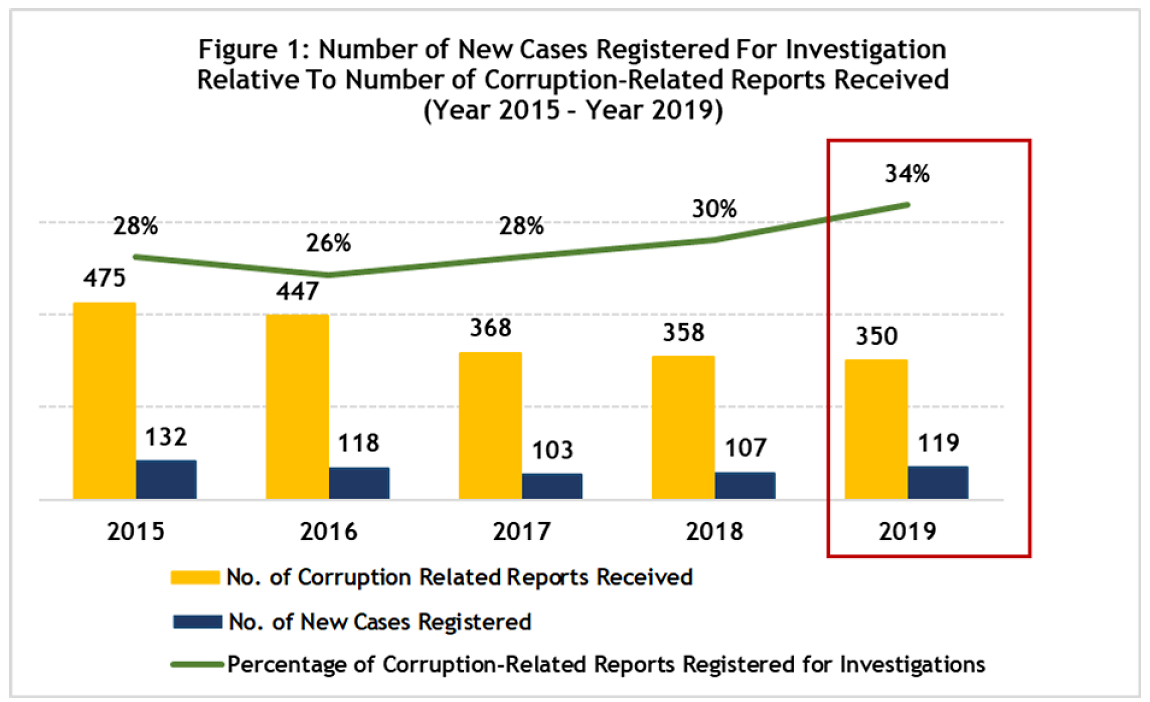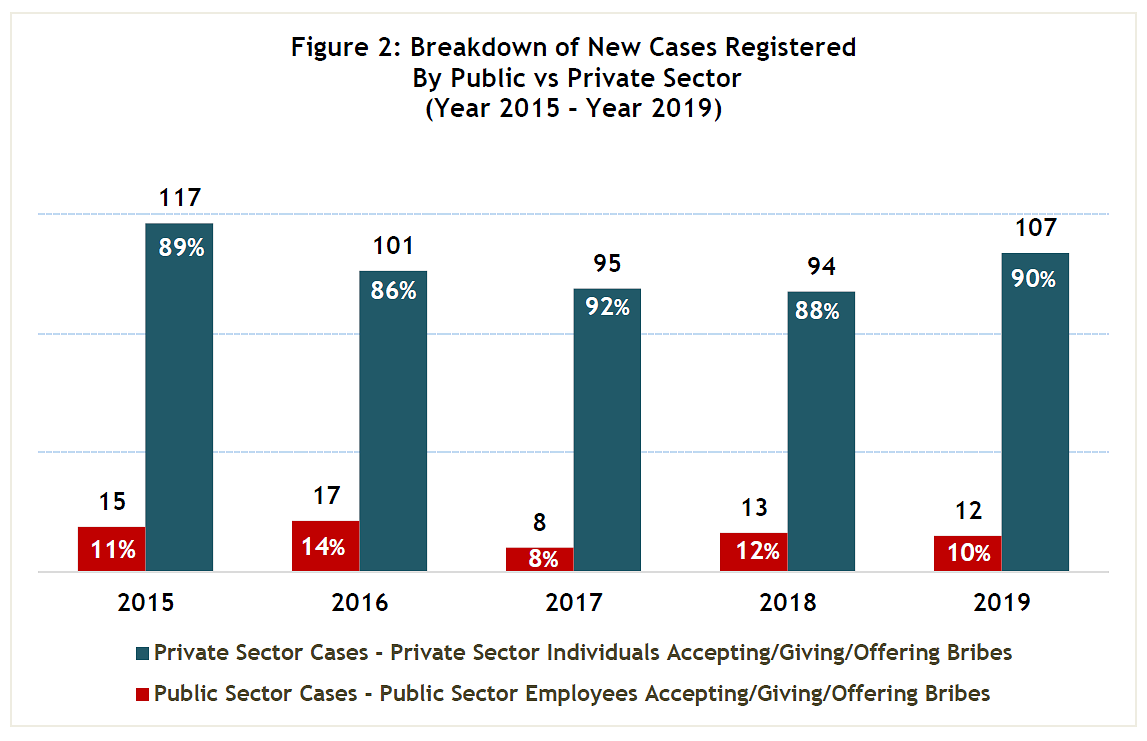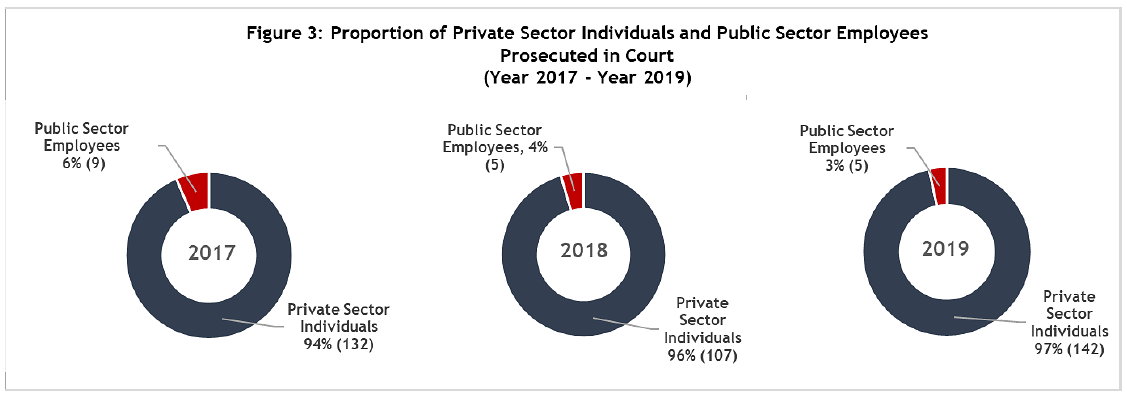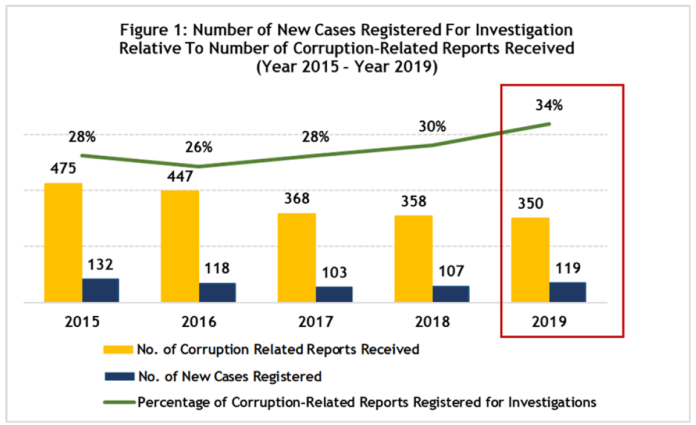SINGAPORE: While fewer corruption-related reports were received in 2019, more cases were registered for investigation.
Even so, the overall statistics show that the corruption situation in Singapore remains “firmly under control”, the Corrupt Practices Investigation Bureau (CPIB) said in a press release on Wednesday (Apr 29).
The agency said it received 350 corruption-related reports in 2019, a slight fall from the 358 in 2018. But of these, CPIB registered 119 cases for investigation in 2019, up from the 107 the year before – an increase of 11 per cent.
The total percentage of registered cases increased to 34 per cent, compared to the annual average of 28 per cent over the last four years.

Corruption cases are evaluated by the Complaints Evaluation Committee and a case is registered for investigation “if the information received is pursuable”, which is determined by the “quality of relevant information provided”.
CPIB said more reports ended up being registered for investigation because of better quality information, coupled with “efforts to enhance investigative enquiries and intelligence probes”.
CPIB said it takes a “takes a serious view of all reports and information that may disclose any offence under the Prevention of Corruption Act”.
It added that such reports and information are “thoroughly reviewed regardless of the nature or amount of gratification, or whether the complainant is named or anonymous”.
It also offered a guide on the kind of information one should include in a corruption complaint:
- Where, when and how the alleged corrupt act happened?
- Who was involved and what their roles were?
- What was the bribe given and the favour shown?
PRIVATE SECTOR CASES
In 2019, private sector cases continued to form the majority of cases registered for investigation at 90 per cent.
There were 107 such cases in 2019, slightly higher than the annual average of the past four years.
Of these cases, 10 per cent, or 11 cases, involved public sector employees – officers from the Singapore Police Force, the Immigration & Checkpoints Authority, Singapore Customs and the Central Narcotics Bureau – rejecting bribes offered by private sector individuals.

The majority of individuals prosecuted in court – 142 out of 147 – were from the private sector.
A significant proportion of these were in construction and building maintenance work at 30 per cent.
PUBLIC SECTOR CASES
Public sector cases accounted for 10% of all cases registered for investigation in 2019, said CPIB.
The number of public sector cases registered in 2019 remained low at 12 cases, similar to the annual average of the preceding four years.

Public sector employees made up about 3 per cent of the total number of individuals prosecuted in court in 2019, comparable to the previous two years.
Custodial sentences were meted out to these individuals convicted of corruption offences, said CPIB.
CORRUPTION SITUATION IN SINGAPORE
The corruption situation in Singapore remains firmly under control, said CPIB, citing the international community’s regard for Singapore’s anti-corruption efforts.
A higher annual clearance rate for CPIB cases in 2019 was achieved, with investigations into 85 per cent of the total number of subjects investigated by CPIB in the year completed.
This represented a 5 per cent improvement from the previous year despite an “increased workload”.
Conviction rates for CPIB cases over the past 5 years have remained above 97 per cent, due to a “strong commitment to bring corrupt offenders to task” along with the Attorney-General’s Chambers (AGC).
CPIB also highlighted that Singapore was ranked the fourth-least corrupt out of 180 countries and territories in the Transparency International Corruption Perceptions Index, as well as Singapore improving on its score while maintaining its top position in the latest Political & Economic Risk Consultancy 2020 Corruption Survey.
“Singapore has achieved good results in the fight against corruption, but we cannot afford to let our guard down. Corruption must not be allowed to creep into our way of life and undermine Singapore’s reputation for being an incorrupt and fair society,” said CPIB.
“CPIB remains resolute and committed in combating corruption and will continue to strengthen its operational capabilities to better detect and investigate corruption offences.”





